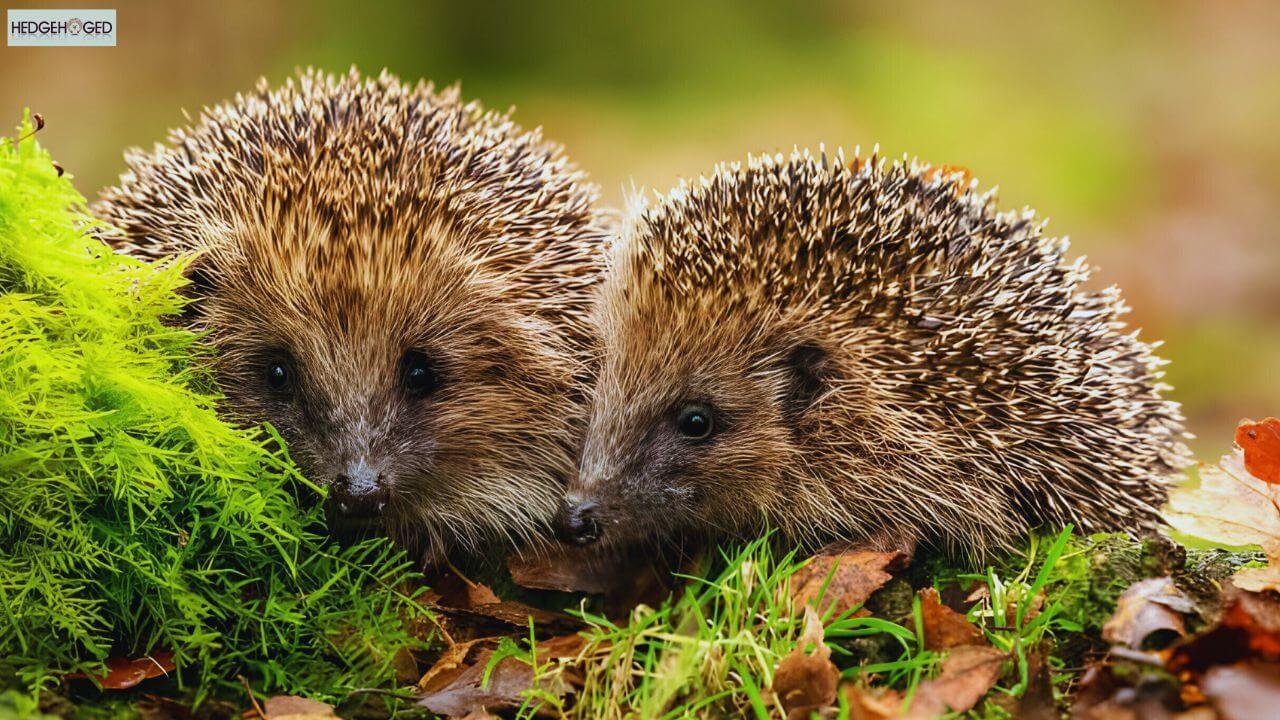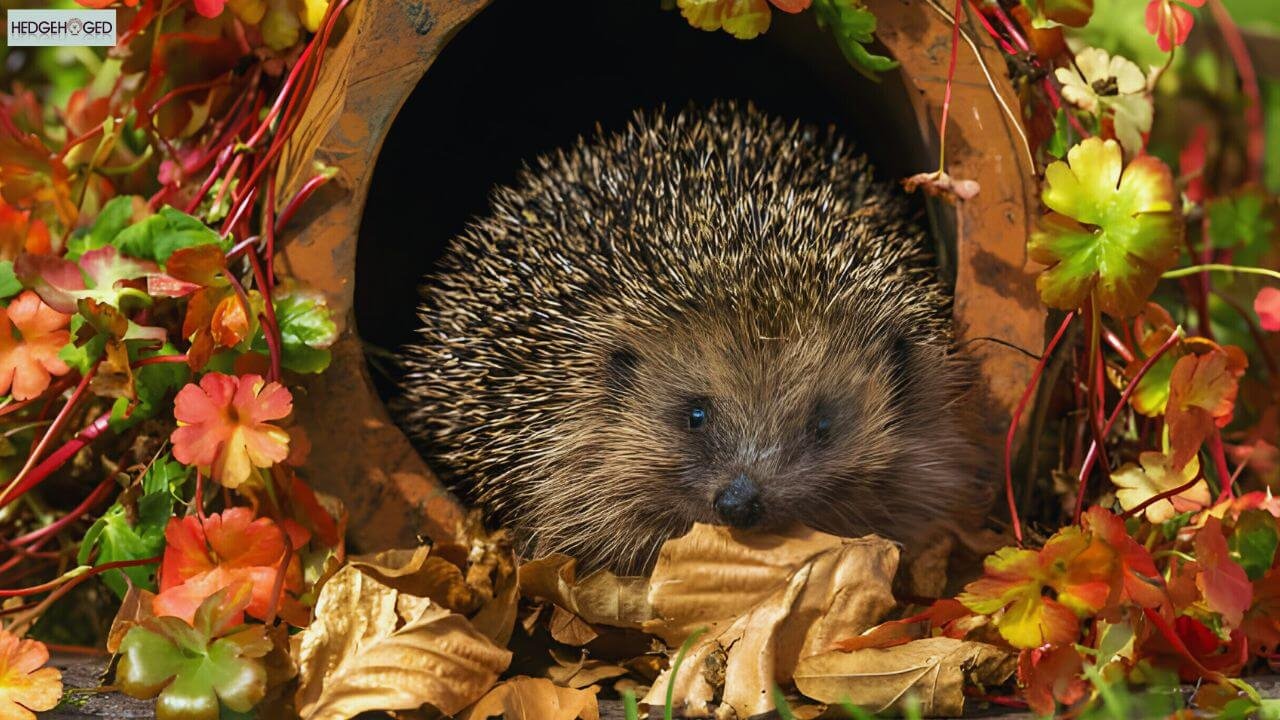Hedgehogs are also a popular pet among tiny animal lovers. With hedgehogs becoming increasingly popular as pets, many new hedgehog owners are unsure what type of behavior to expect from their new family members over the winter. Many users think that when do hedgehogs hibernate?
Hedgehogs in the wild can hibernate from December to March, depending on the weather and food availability. Captive hedgehogs do not hibernate, however they do sleep for most of the day.
Hedgehogs are one of the few animals that truly hibernate. Hedgehogs do not sleep during hibernation; rather, they lower their body temperature to match their environment and enter a condition of inactivity. In this article, we’ll explore about hibernation of hedgehogs.
Why do Hedgehogs Hibernate?
The timing of hibernation varies greatly based on the availability of food and the climate. Hibernation in England typically lasts from March or April through October or November. Hibernation lasts considerably longer in Scandinavia and seldom occurs at all on the North Island of New Zealand due to its exceptionally mild winters.
Warm autumns or mild winters will delay Hibernation. Just as the early onset of spring may bring hedgehogs back out earlier. Males hibernate earlier than females. Females require time to replenish their fat reserves that have been depleted by reproducing and rearing offspring, particularly if they produce a late litter.
Males have all summer to gain weight since they are the only members of the reproduction process who mate. It’s common for them to be prepared for hibernation by mid-September.
What is Hibernation?
In the cold, dark days of winter, snuggling up and sleeping for a few months may seem like a wonderful plan. And hibernation is sometimes defined as going to sleep for the winter. However, hibernating is not the same as sleeping. In some respects, it’s almost the polar opposite.
Sleep is a physiological necessity, it’s a time when the body and mind undertake extensive maintenance and repair. Without sleep, our physical and mental health deteriorates swiftly. Though we may not realize it, sleep is a tremendously active period for the body and mind.
In contrast, hibernation is a time of shutdown. Studies have demonstrated that many organisms require a nap since it is so distinct from sleep.
Hibernation is a nearly sci-fi-like slowdown of the hedgehog’s biological activities. For example:
- Heart rate drops from more than 200 beats per minute to fewer than ten.
- The body’s temperature dips from roughly 35 degrees Celsius to less than 10.
- Breathing slows to the point that hedgehogs only need to take a few short breaths every hour. (Wild Life Online)
- Except for a tiny part of the hypothalamus that stays sensitive to danger, the brain essentially shuts down. (New Scientist.)
- Growth ceases. Growth rings on a hedgehog’s bones, similar to those seen on trees, indicate when it has hibernated. (Patrick Morris).
- This all results in such energy savings that fat stores, which would only last an active hedgehog 16 hours, can maintain her for 120
When Do Hedgehogs Hibernate?
Hedgehogs often begin hibernating in November, when the weather gradually becomes cold. When do hedgehogs come out of hibernation? They emerge from their profound hibernation in the spring, between March and April, when the weather begins to lighten and warm.
The hedgehog’s food supply during hibernation is derived from fat deposits accumulated throughout the summer. Hedgehogs need to eat sufficiently before hibernating, and extra feeding can help them do so. Any interruption during this time can be exceedingly deadly since hedgehogs deplete their valuable energy reserves in an attempt to reactivate.
Why Have Hedgehogs Evolved To Hibernate?
Hibernation seems to be a response to unfavorable environmental conditions. It has been determined by scientists that all major mammals, including humans, carry the “hibernation gene.” Of course, not all animals hibernate, either.
Creatures who do hibernate have evolved in ways that make hibernation possible. For example, the human heart (and many mammal hearts) cannot function if its temperature falls below 28c. At that temperature, calcium starts to gather around the heart and causes a heart attack.
The hedgehog’s body temperature falls below 10c during hibernation. The heart rate slows, but it certainly doesn’t cause a heart attack. Why is this? Hibernating animals, unlike humans, have developed a unique pump to remove calcium from the heart.
Given the prevalence of the hibernation gene in organisms, why have some evolved to hibernate while others have not? Well, it’s thought to be one response to unfavorable environmental conditions. Humans, for example, evolved in Equatorial Africa.
There is little seasonal change here, and food is accessible all year round. Contrast this with the European hedgehog, which developed in an environment with distinct seasons and considerable seasonal dietary fluctuations.
What Temperature Do Hedgehogs Hibernate?
Before hibernation, a hedgehog needs to replenish its fat reserves. The hedgehog stores two different types of fat for hibernation. White fat, like the fat on bacon, is stored throughout the body. It is used to keep the hedgehog alive when in hibernation. There are also pockets of brown fat in certain areas of the body, such as behind the shoulders. These are kept in reserve for usage when the hedgehog needs to awaken from hibernation.
During hibernation, most of the hedgehog’s physiological activities slow to practically a halt. The heart rate drops to under 10 beats per minute. Body temperature decreases from 35 degrees Celsius to less than 10.
Breathing slows to the point that a hibernating hedgehog may only take a few breaths every hour. Except for one tiny section of the hypothalamus that remains attentive to monitor vital signs and potential dangers, brain activity essentially ceases.
All body systems shut down to the point where a sleeping hedgehog has only a fraction of the daily energy requirements of an active one. So fat stores that would keep an active hedgehog running for 16 hours can last a hibernating hog for 170 days.
Is Hibernation the Same as Sleep?
No, hibernation and sleep are not the same thing. Sleeping and hibernating are two rather distinct biological processes. For most animals, sleep is a physiological need. During this time, a lot happens in terms of cell regeneration and repair. In contrast, very little occurs during hibernation or torpor.
The body is not repairing or renewing itself; rather, it is shutting down functions to save energy. Since hibernation and sleep are so unlike, lemur research hypothesizes that hibernation may be broken sometimes to allow for a brief period of sleep.
Do Hedgehogs Hibernate in Captivity?
A captive hedgehog should not attempt to hibernate if its enclosure is kept at the appropriate temperature. Hedgehogs only hibernate when they are physically cold. A hedgehog that is kept indoors should not attempt to hibernate.
If your indoor hedgehog is attempting to hibernate, it might mean that its environment is too chilly. While hedgehogs maintained indoors are unlikely to be concerned about not gaining enough weight to hibernate, they are more likely to enter partial hibernation as a result of their confinement.
Humans seldom prefer to keep their homes constantly below the 40-degree range in the winter, and if the air isn’t cold enough when the hedgehog goes into hibernation, they won’t properly hibernate and will die if kept that way.
When do Hedgehogs Hibernate in the Winter?
Hedgehogs may live in hibernation with body temperatures as low as 1°C, or barely above freezing. Their nests are also well-insulated, keeping out the cold. However, if the outdoor temperature dips below -8 degrees for a lengthy period, the hedgehogs’ bodies may freeze. If this happens, ice crystals may grow within, killing them.
Hibernating hedgehogs are aware of freezing situations that might be dangerous to them. If the weather becomes so cold that they risk freezing, they voluntarily or partially awaken from hibernation, boosting their body temperature.
Is it Harmful to a Hedgehog to miss out on Hibernation?
With abundant food and a mild winter, there is no incentive for it to hibernate. If you rescue a young, underweight hog in the autumn and keep it warm and well-fed indoors, it will be able to stay active throughout winter with no problems. Hedgehogs in the wild, in warmer climates with year-round food supply, will often avoid hibernation entirely.
Is Hibernation Continuous?
No, hibernation isn’t continuous. Hedgehogs frequently wake up numerous times throughout the winter. Winter activity is quite normal. Some people become active for a few days at a time, while others may go months without moving.
During these active moments, they may remain in their nests, go for a walk and a drink, or build a new nest. So, seeing a hedgehog outside at night during the winter is no reason for fear. However, if you spot one outside during the day in the winter, it is most likely difficult, and you should bring it in and contact your local hedgehog rescue.
Is Hibernation Dangerous for Hedgehogs?
Yes, hedgehogs are at risk during hibernation. They just carry out the necessary actions. Aside from the threat of freezing, as we described previously, there are other hazards that a hibernating hog must deal with.
A hibernating hog will take many hours to completely “come round,” making them a sitting target for predators such as badgers. Being disturbed by humans, foxes, dogs, or cats can also create issues.
However, the most serious concern is being underweight. A hedgehog that is underweight and goes into hibernation will not survive the winter. A hog that is very underweight when it rouses in the spring is also at risk. This is one of the most important places where we humans can contribute.
FAQs
Q1. What triggers hedgehogs to hibernate?
As the temperature cools, such food becomes more difficult to locate, prompting them to reduce their energy use.
Q2. Do hedgehogs eat when hibernating?
Hedgehogs need to eat sufficiently before hibernating, and extra feeding can help them do so.
Q3. What months do hedgehogs hibernate?
Hedgehogs normally hibernate from October/November to March/April.
Q4. How long does a hedgehog sleep?
Eighteen hours a day is how long hedgehogs can sleep! In addition, hedgehogs truly hibernate.
Q5. When hedgehogs hibernate, do they get cold?
Hedgehogs may hibernate without being heated; in fact, they cool down to the same temperature as their surroundings.
Conclusion
In summary, we explain the common question when do hedgehogs hibernate? The hibernating phase is essential. Please don’t hesitate to get in touch with your local wildlife society for additional details and support if you have concerns about a hedgehog in your care or on your land.
They can help you navigate the process of making sure the hedgehogs in your life are secure. Even while it might seem safer to keep them inside, doing so might negatively impact the young hedgehogs that are born to the hedgehogs you are caring for and interfere with their capacity to survive in the wild.




